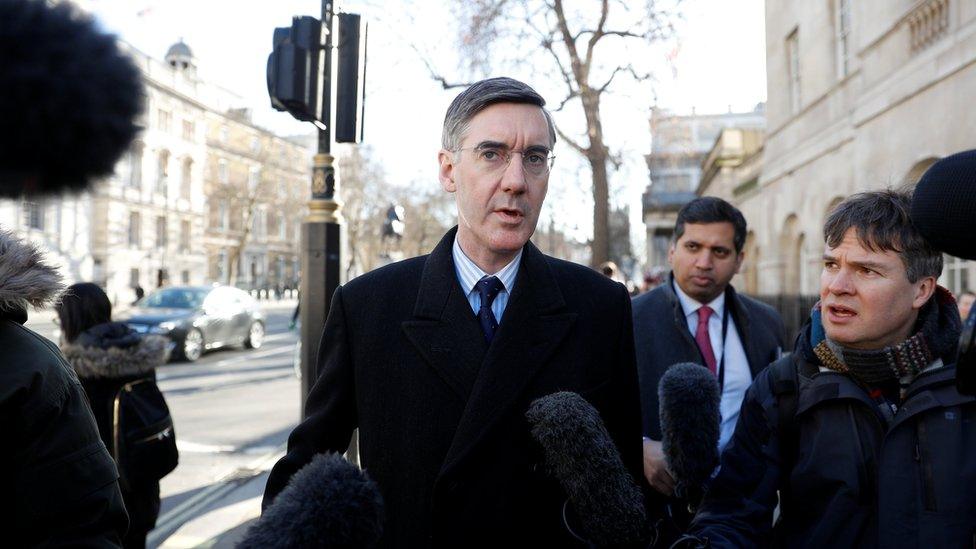Brexit: Is Rees-Mogg ready to compromise on the backstop?
- Published

Jacob Rees-Mogg has said it would be "very difficult" for Brexiteer Tories to support Theresa May unless she secures actual changes to the text of her Brexit deal.
The remarks by the leader of the European Research Group may complicate Downing St attempts to find a consensus among Conservative MPs in a Commons vote tomorrow.
Downing St is hoping that it can win support for a backbench amendment that calls for the Northern Ireland backstop to be replaced.
Sir Graham Brady, the chairman of the backbench 1922 committee, who is tabling the amendment, has said his goal could be achieved through a separate legal codicil.
This would leave the original Withdrawal Agreement with the EU unamended.
Jacob Rees-Mogg suggested this may not go far enough for Brexiteer Tories.
Asked whether the Withdrawal Agreement would have to be rewritten or whether he would be happy with a legal codicil attached to the end, Mr Rees-Mogg said: "The text is the authoritative text and Article Four says it is superior law. So any amendment would have to be subject to the qualifications of Article Four and be superior law.
"Therefore it would be preferable to do it in the body of the text rather than to have a codicil...I think it would be very difficult to support it without the actual text being opened up."
In a sign of a possible compromise, Mr Rees-Mogg qualified his remarks by saying he could possibly support a legal codicil if that helped to save face in Brussels.
Speaking after a meeting with ministers in Whitehall, he added: "I don't want to split hairs. You may get to the point where you need to save people's face and therefore you say the text hasn't changed and you've got a codicil that says this bit of text doesn't apply. But that comes to the same thing."
Mr Rees-Mogg was among a number of Conservative MPs and MEPs who met the prime minister and other ministers ahead of another Brexit vote in parliament tomorrow.
The prime minister is embarking on a two-part strategy:
Mrs May hopes that a significant body of Conservative and DUP MPs, who recently rejected her Brexit deal, will support Graham Brady's amendment or another calling for a time limit on the Northern Ireland backstop. If there is strong movement among Tory MPs - even if one of the amendments failed - then the prime minister would go to Brussels and say that her deal could be passed in Parliament if there were major changes to the backstop. But the EU is currently ruling out any changes to the backstop in the Withdrawal Agreement.
No 10 wants to persuade former Remain-supporting Conservative MPs who want to rule out no deal, by voting tomorrow in favour of a bill that would allow for an extension to article 50, to hold off. (The extension would allow Mrs May to embark on another round of negotiations with Brussels.) Instead, she would reassure those MPs by saying that she would come back to Parliament next month with a definitive statement and the chance for them to table their amendments in a more legally watertight process.
Government sources have suggested that they hope that Mr Rees-Mogg could lead around 80% of the ERG to support the prime minister in tomorrow's vote, given the right assurances on the backstop. But Mr Rees-Mogg said his group was united.
"The ERG is a very harmonious body, we are, more harmonious than the BBC I should think. I think we are pretty united. I think we have a pretty clear view of what is going on. I don't notice any great divisions within the ERG."
Asked whether peace and harmony reigns in the Conservative party, as Remainers and Brexiteers were hosted in the cabinet office, he said: "Pray that Jerusalem may have peace and felicity."
You can watch Newsnight on BBC 2 weekdays 22:30 or on iPlayer. Subscribe to the programme on YouTube, external or follow them on Twitter, external.
- Published25 January 2019
- Published16 October 2019

